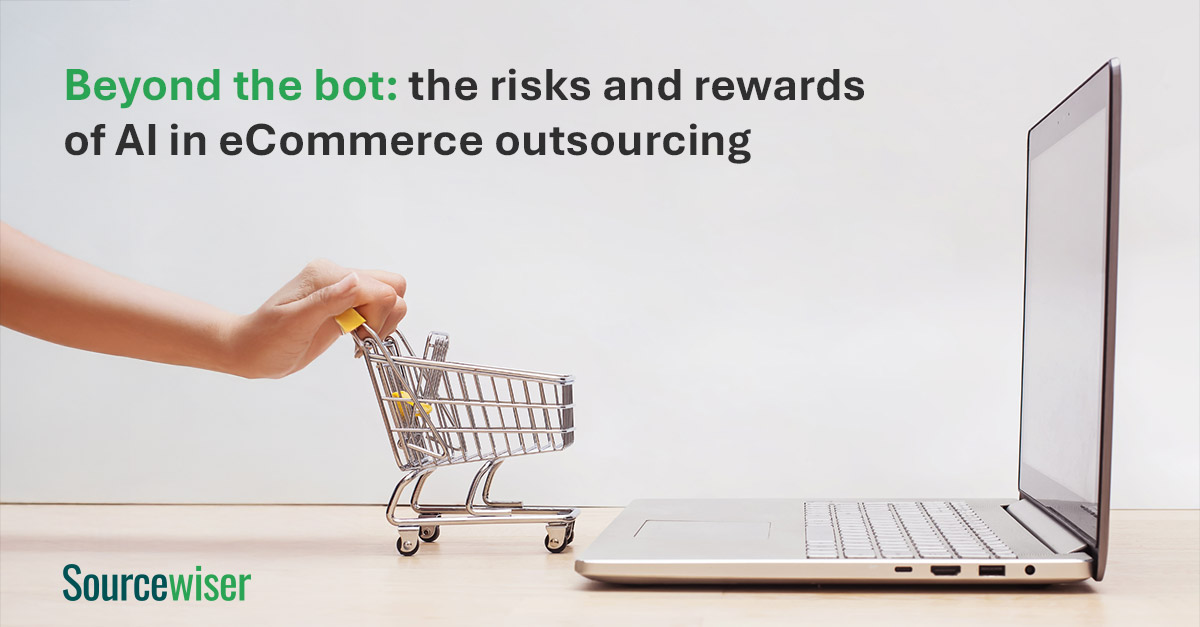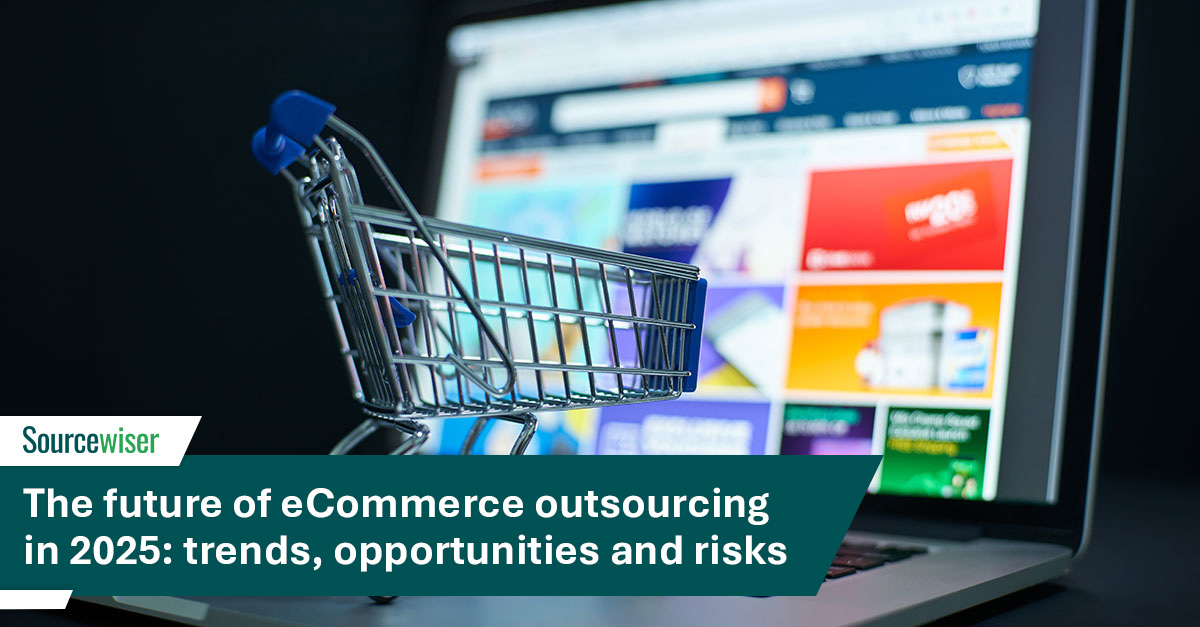Artificial intelligence is reshaping eCommerce operations at an incredible pace. From predictive logistics and personalised marketing to automated customer support, AI is now embedded across the value chain. Yet as automation expands, so do the risks. Accuracy, brand tone, compliance and data governance are increasingly under scrutiny.
McKinsey’s State of AI 2024 reports that 72% of organisations use AI in at least one business function, with retail and eCommerce leading adoption. However, only 38% have implemented robust risk management frameworks. This gap highlights a growing leadership challenge, how to scale AI responsibly while maintaining trust, particularly when outsourcing is part of the delivery model.
When supported by the right outsourcing partner, AI enables scalable, intelligent operations that uphold brand integrity and strengthen customer experience. It should not be viewed as a replacement for people, but as a tool that enhances human capability, driving efficiency while preserving the human touch that builds trust and loyalty.
To understand how AI can be applied effectively in outsourced eCommerce operations, it’s important to first explore the tangible advantages it brings when implemented with the right strategy and oversight.
The upside: what AI delivers in eCommerce outsourcing
AI is no longer just a tool for automation, it’s a strategic enabler that’s redefining how eCommerce businesses scale. In outsourcing environments, its impact is especially pronounced, driving precision, speed and adaptability across core functions.
- Personalisation at scale
AI is transforming how retailers connect with customers by enabling deeply personalised experiences across every touchpoint. Through intelligent algorithms, businesses can deliver hyper-targeted product recommendations, dynamic pricing and tailored marketing messages that adapt in real time to individual behaviours and preferences.
This level of personalisation not only enhances relevance but also drives measurable results, retailers leveraging AI-powered personalisation have seen conversion rates increase by an average of 20%, according to the Adobe Digital Economy Index 2024. When delivered via an outsourcing model, these capabilities can be scaled efficiently, allowing brands to maintain consistency and impact across markets and channels.
- Faster fulfilment and support
Responsiveness is critical in today’s fast-paced retail landscape. AI-powered order management, chatbots and predictive logistics streamline fulfillment and customer support, enabling faster delivery and more agile operations. Within outsourcing teams, AI enhances service functions by classifying queries, prioritising urgent issues and recommending responses based on historical interactions. These tools reduce wait times and improve resolution speed, while human agents continue to provide the empathy and nuance that machines can’t replicate. Together, they create a more seamless and satisfying customer experience.
- Smarter forecasting
Machine learning strengthens demand prediction and inventory optimisation by uncovering behavioural patterns and market signals. These insights allow businesses to anticipate customer needs, adjust stock levels and make proactive decisions with greater confidence. When integrated into outsourcing operations, AI-led analytics support more accurate planning, reduce waste and improve supply chain responsiveness across regions.
- Operational efficiency
AI is redefining how outsourced teams manage high-volume, repetitive tasks such as product tagging, returns processing and customer queries by automating workflows that traditionally consumed significant time and resources. This shift allows human teams to focus on more strategic, value-adding work. According to the Global Outsourcing Survey, organisations leveraging AI-powered outsourcing report higher satisfaction levels and improved throughput compared to those relying solely on manual processes.
These outcomes reflect a broader trend: 92% of organisations are already leveraging or planning to leverage AI in service delivery. But while the benefits are clear, realising them at scale requires more than technology. Governance, human oversight and strategic alignment are essential to ensure AI delivers value without compromising trust.
The risks: where AI can go wrong
While AI is transforming outsourcing with speed and scale, its adoption also introduces a set of risks that, if left unmanaged, can undermine trust, compliance and brand integrity. Many organisations still struggle to realise the full value of AI due to gaps in delivery maturity, governance and strategic alignment. Below are the key areas where AI in outsourcing can go wrong and why human oversight remains essential.
-
Accuracy and brand voice
AI-generated content, whether in customer communications, product descriptions or chatbot interactions can easily stray from a brand’s tone, values or factual accuracy. This is particularly risky in outsourced environments where teams may be managing multiple brands or markets. Without clear brand guidelines and human-in-the-loop validation, AI outputs can feel inconsistent or misleading, eroding customer trust and diminishing brand equity.
- Bias and fairness
AI systems are only as good as the data they’re trained on. When that data is incomplete, unbalanced or historically biased, the resulting outputs can reinforce stereotypes or exclude certain customer segments. In outsourcing contexts, where AI may be used to automate hiring, customer segmentation or service prioritisation, unchecked bias can lead to reputational damage and even legal exposure. Ensuring fairness requires diverse training data, regular audits and ethical oversight.
-
Data privacy and compliance
AI often relies on large volumes of personal and behavioural data to function effectively. However, this creates significant exposure to privacy risks especially when data is handled across borders or by third-party providers. Without robust data governance, encryption protocols and compliance with regulations like the Privacy Act 1988 (Cth) or GDPR, organisations risk breaches, fines and loss of customer confidence. Outsourcing partners must demonstrate strong security practices and transparent data handling policies.
-
Loss of human empathy
While AI excels at speed and scale, it lacks the emotional intelligence required to navigate complex or sensitive customer interactions. Over-automation, particularly in customer service, can result in impersonal experiences that frustrate users and reduce satisfaction. In outsourcing models, where customer-facing roles are often delegated, it’s critical to maintain a balance between automation and human empathy. Hybrid models that combine AI efficiency with human nuance are proving to be the most effective.
AI’s value in eCommerce outsourcing lies in its ability to automate intelligently, monitor continuously and preserve the human element. The most effective models strike a balance, where technology handles scale and speed, and people provide empathy, judgment and brand alignment. This equilibrium is not achieved by software alone. It depends on choosing the right outsourcing partner, one that understands how to govern AI responsibly, embed human oversight and scale operations without compromising trust.
Why the right outsourcing partner matters
When supported by the right outsourcing partner, AI enables intelligent operations that uphold brand integrity and strengthen customer experience. But whether it delivers on its promise or introduces new risks, depends entirely on who’s guiding the system.
AI is only as effective as the frameworks around it. Without strong governance, human oversight and strategic alignment, automation can drift off course, compromising accuracy, compliance and customer trust. The right partner doesn’t just deploy tools; they embed them within a structure that ensures accountability, brand consistency and ethical use.
Here are four capabilities that define an AI-ready outsourcing partner:
- Human oversight and brand governance
AI can streamline workflows, but it’s the human layer that ensures quality and consistency. Leading providers embed brand voice guidelines and quality assurance checkpoints into every AI-supported process. Their teams are trained not just to operate systems, but to uphold your brand’s tone, values and customer expectations ensuring automation enhances rather than dilutes your identity.
AI often relies on sensitive customer and operational data. A trusted partner must demonstrate robust data protection protocols, secure infrastructure and compliance with both Australian and global standards such as ISO 27001. Ethical AI governance, including audit trails, approved data sources and clear accountability is critical to mitigating regulatory and reputational risk.
- Transparent reporting and accountability
Partners play a critical role in ensuring AI performance is not only effective but also measurable. To maintain trust and drive continuous improvement, they must provide regular reporting on key metrics such as accuracy, response quality and customer satisfaction. This level of transparency allows businesses to identify issues early, refine processes and ensure that AI outcomes remain aligned with strategic goals.
- Adaptability and responsible innovation
A forward-thinking partner enables you to explore AI capabilities without overcommitting to infrastructure or long-term contracts. They offer flexible models that support experimentation, pilot programs and phased rollouts. According to Deloitte’s Global Outsourcing Survey, 67% of executives now prioritise providers who integrate AI responsibly within established governance frameworks.
For a deeper look at what makes an outsourcing partner truly AI-ready, you might find our guide on How to evaluate outsourcing partners: the questions leaders forget to ask. It explores the governance, oversight and alignment practices that often get overlooked but make all the difference.
In practice: scaling eCommerce operations with AI
The impact of AI in outsourcing becomes most evident when applied to real operational challenges. A global eCommerce brand partnered with Sourcewiser to scale its digital operations while maintaining consistency and customer experience across markets.
The engagement focused on automating high-volume tasks such as product tagging, campaign reporting and customer enquiry classification. AI tools were deployed to streamline these workflows, enabling faster turnaround and reducing manual effort. However, what made the model effective was the continued involvement of human specialists. These team members reviewed AI outputs, resolved exceptions and ensured that content and responses aligned with brand standards and regional nuances.
The result was a measurable lift in efficiency, improved campaign performance and stronger customer engagement. More importantly, it demonstrated how AI and human oversight can complement each other, not just to optimise processes, but to elevate the quality, accountability and brand integrity.
Building an AI-ready outsourcing strategy
To integrate AI into eCommerce outsourcing effectively, leaders need a structured approach that balances innovation with control. A practical framework includes:
- Define the business problem
Start with clarity. Identify the specific challenge AI is meant to solve, whether it’s reducing cart abandonment, improving fulfilment speed or enhancing customer support responsiveness. - Set governance and compliance rules
Establish clear policies for data handling, ethical use and regulatory compliance. This is especially critical when customer data flows across borders or is managed by third-party providers. - Combine human QA with AI monitoring
Automation needs oversight. Embed human quality assurance into AI-supported workflows to ensure product descriptions, customer interactions and promotional content remain accurate, empathetic and aligned with brand tone. - Measure success by outcomes, not automation levels
Focus on impact. Track metrics like conversion rates, customer satisfaction and fulfilment accuracy, not just the number of tasks automated.
According to Gartner, businesses using hybrid human-AI outsourcing models report 30% higher productivity and 25% better customer satisfaction. With the right strategy, AI becomes a lever for scalable, intelligent delivery, without compromising trust.
AI is transforming eCommerce outsourcing, but its success depends on more than algorithms. Human judgment, compliance and brand alignment remain essential. The most effective models blend intelligent automation with skilled human oversight, creating operations that are not only faster but also more empathetic and trustworthy.
Retailers that treat AI as an accelerator, not a replacement, are best positioned to lead. With the right outsourcing partner, AI becomes a strategic enabler, driving efficiency while preserving the human touch that builds loyalty. The future belongs to those who govern AI responsibly, scale it thoughtfully and embed it within a framework of trust and transparency.
As retailers look to scale intelligently, especially during high-demand periods, the role of AI-enabled outsourcing becomes even more critical. For a closer look at how flexible delivery models support seasonal growth without compromising quality, explore our next article: Scaling through seasonal peaks: how eCommerce outsourcing services drive flexible growth.




